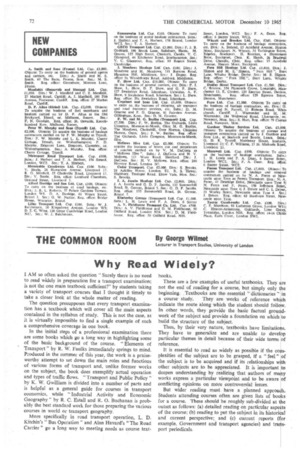Why Read Widely?
Page 74

If you've noticed an error in this article please click here to report it so we can fix it.
I AM so often asked the question "Surely there is no need to read widely in preparation for a transport examination; is not the one main textbook sufficient?" by students taking a variety of transport courses that I thought it timely to take a closer look at the whole matter of reading.
The question presupposes that every transport examination has a textbook which will cover all the main aspects contained in the syllabus of study. This is not the case, as it is virtually impossible to find a single example of such a comprehensive coverage in one book.
In the initial steps of a professional examination there are some books which go a long way in highlighting some of the basic background of the course. "Elements of Transport" by R. W. Faulks immediately springs to mind. Produced in the summer of this year, the work is a praiseworthy attempt to set down the main roles and functions of various forms of transport and, unlike former works on the subject, the book does exemplify actual operation and types of traffic flows. "Transport and Public Policy" by K. W. Gwilliam is divided into a number of parts and is helpful as a general guide for courses in transport economics. while "Industrial Activity and Economic Geography" by R. C. Estall and R. 0. Buchanan is probably the best standard work for those preparing the various courses in world or transport geography.
More specifically in road transport operation, L. D. Kitchin's "Bus Operation " and Alan Havard's "The Road Carrier" go a long way to meeting needs as course text books.
These, are a few examples of useful textbooks. They are not the end of reading for a course, but simply only the beginning. .Textbooks are the essential " dictionaries " in a course study. They are works of reference which indicate the route along which the student should follow. In other words, they provide the basic factual groundwork of the subject and provide a foundation on which to build the structure of the subject.
Thus, by their very nature, textbooks have limitations. They have to generalize and are unable to develop particular themes in detail because of their wide terms of reference.
It is essential to read as widely as possible if the complexities of the subject are to be grasped, if a " feel " of the subject is to be acquired and if its relationships with other subjects are to be appreciated. It is important to deepen understanding by realizing that authors of many works express a particular viewpoint and to be aware of conflicting opinions on more controversial issues.
But wider reading must have a planned approach. Students attending courses often are given lists of books for a course. These should be roughly sub-divided at the outset as follows: (a) detailed reading on particular aspects of the course; (b) reading to put the subject in its historical and current perspective; and (c) current reports (for example, Government and transport agencies) and trailsport periodicals.




























































































































